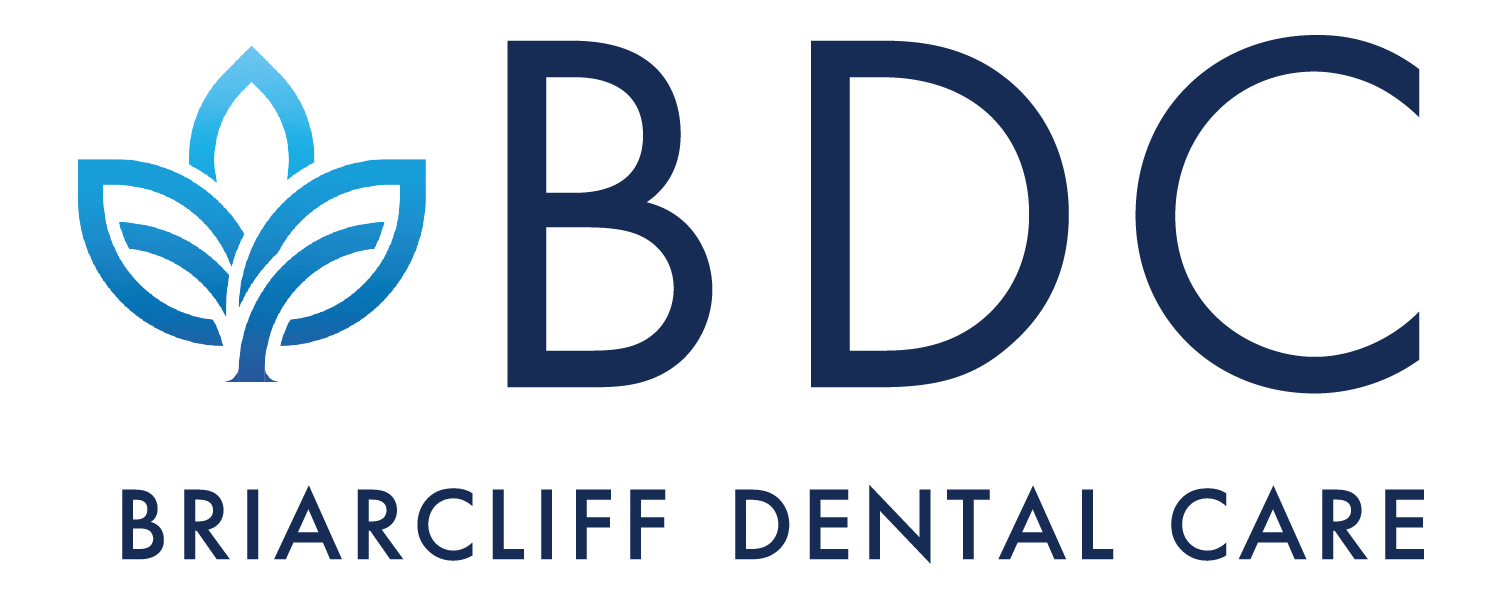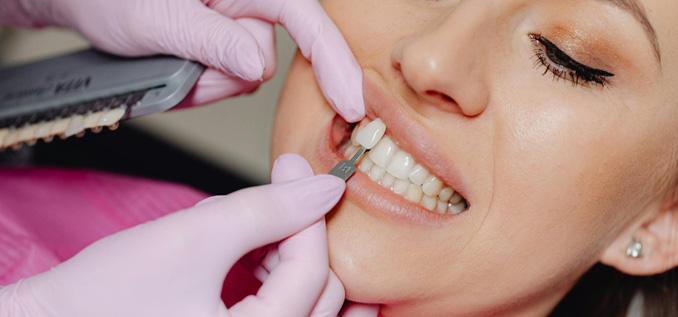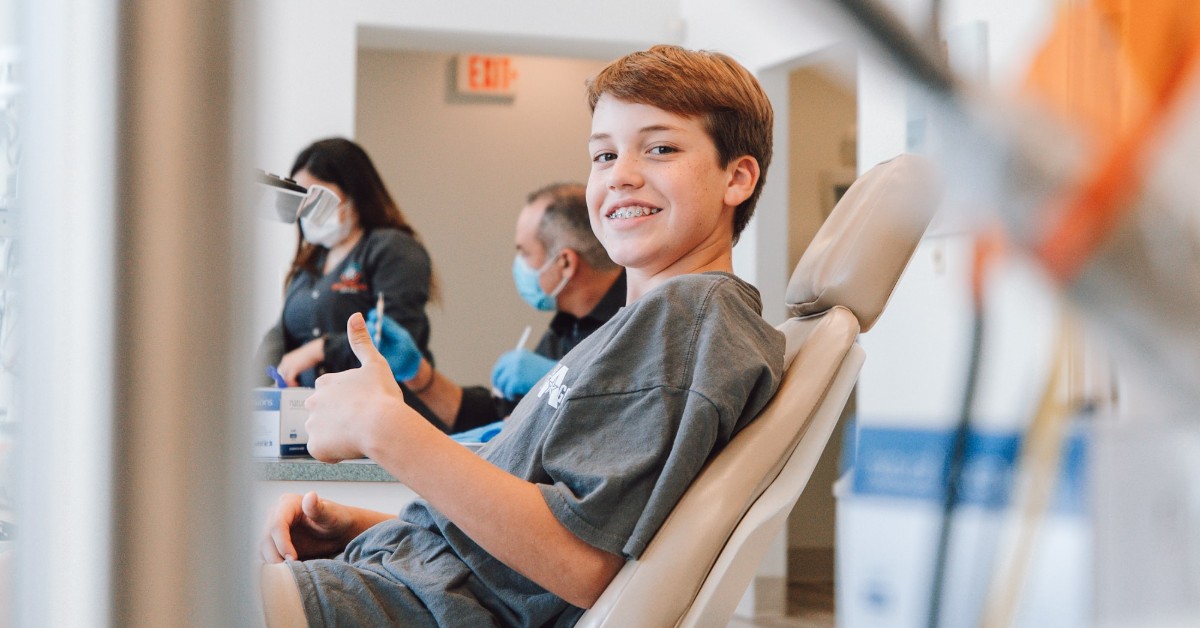Many have heard the term “dental veneers” but are not completely clear on what it is or how it compares to other dental options. To help you evaluate whether veneers are the right choice for you, we will share our answers to the dozen questions we hear most frequently:
- What Are Veneers?
- Types of Dental Veneer – Porcelain versus Resin; Permanent versus Semi Permanent
- When Can You Get Veneers?
- Advantages of Dental Veneers
- Disadvantages of Veneers
- Three Apppointment Veneer – Diagnosis & Planning, Customized Trial, Permanent Veneer Placement
- One Appointment Veneers
- The Cost of Dental Veneers
- Does Getting Dental Veneers Hurt?
- How Long Do Veneers Last?
- Taking Care of Your Veneers
- Alternatives to Veneers
Veneers Explained
A veneer is what you think it is – a facade. Dental veneers are paper-thin pieces of porcelain or resin composite that cover the front of a tooth. The custom-made shells are typically bonded to some (or all) of the teeth that are visible when smiling.
The purpose of a veneer is to enhance the appearance, shape, length or color of teeth. Unlike a crown that provides structural support, veneers are essentially cosmetic. Applying a veneer is an option for someone who has (mostly) healthy teeth but wants to enhance their smile. It is a non-invasive procedure to address teeth that are:
- chipped
- discolored
- too small
- too big
- too pointy
- or not ideally positioned
Porcelain Versus Resin Composite
Porcelain is the traditional material for veneers. It is better against staining, lasts longer, and more closely appears like natural teeth. Resin composites offer acquisition cost savings while technological improvement continues to narrow the performance and appearance gap.
No prep-veneers are a low fuss option that requires little preparation. It is suitable for teeth that do not need reshaping. It costs less but does not last as long as other veneers.
It is possible to mix no-prep and porcelain veneers on different teeth of the same mouth if conditions warrant.
Which veneer option is the best choice for you to enhance your smile?
Veneer Timing
If your mouth is in good health, you are eligible to get veneers right away. If your teeth are slightly crooked, have a small gap, discolored or chipped, there is no need to wait. If you have older veneers that are too thick or beginning to look worn, then an update may be due.
Recent oral trauma – such as a root canal or a broken tooth – will need time to repair, prepare, or heal.
Pros and Cons of Veneers
On the positive side of the ledger:
- Veneers are less painful than braces
- Veneers are less invasive than crowns
- Customization by a competent dentist will achieve the look you want for a confident smile
On the less positive or even negative side of the ledger:
- Veneers applied after teeth must be milled or reshaped, is a procedure with many permanent elements
- Removal of veneers can be painful
- Even porcelain veneers are not as strong as healthy enamel so hard, chewy foods should be avoided
- Once installed, veneers cannot be brightened
- When damaged, “permanent” veneers will have to be replaced
The three-appointments veneer procedure
- First, your dentist will need to assess, measure, and jointly plan your desired veneers
- The middle appointment is for fitting and fine tuning the temporary model of your final veneers
- The third session is placing your final veneers, including color match
Your initial dental consultation should center around identifying the type of smile you want to achieve. Any concerns you may have should surface during this consultation. Your smile and bite will be examined from every angle to achieve the best aesthetics without compromising oral functionality such as eating or speaking. X-rays and an impression will be taken of your teeth.
The measurements will be used to create your new veneers. The fabrication of your mold can take a few days to a few weeks to mold.
The second appointment is to validate the fit of your customized veneers. You will be given temporary veneers. For a 3-week period, you will be able to “test drive” this temporary set for color match and normal bite / speech functionality. This set-up also allows your dentist to “measure twice, cut once”.
Temporary veneers allow your dentist to test and adjust your permanent veneers before any grinding of your teeth. Generally, dentists must mill your teeth the width of your veneer – about 0.5-millimeter. Doing so assures your veneers do not protrude in comparison to your other teeth.
At the third appointment your dentist applies the final veneers. When the feel, look and color of each veneer is “right”, your veneers will be permanently glued. Local anesthetics numb the pain. A deep clean is typical before bonding.
Ultraviolet light cures the adhesive that attaches your veneers to your teeth. Excess cement is removed while your dentist evaluates the look and bite of teeth with veneers.
Your mouth may be sore for a few days. Eventually, numbness will dissipate, and you will return to normal oral routines. Your dentist will have the opportunity to review everything with a follow-up visit anywhere from two weeks to a month after your third appointment.
No-Prep Veneer
No-prep veneers may be suitable for fixing small gaps or improving dis-coloration. If only a minimal amount of enamel removal is needed, this treatment might be possible for you. Also referred to as pop-on or snap-on veneers, Lumineers is a brand name “no-prep” veneer.
These veneers are composite and will last 5 – 7 years. By comparison, porcelain veneers often last over 20 years.
Sometimes called “chairside veneers”, the application of resin with little teeth sculpting can be done in one day. However, that appointment can span hours, and the solution is not as durable as ceramic or porcelain. They are also more prone to staining and breakage.
The Cost of Dental Veneers
Porcelain veneers can range in cost from $1,000 to $2,500 per tooth. This range is a function of material, and the underlying shaping or repair needed for the tooth. Composite veneers or resin provide savings in the range of 50%. Most insurance plans classify veneers as cosmetic and typically exclude such treatment from coverage.
Do Dental Veneers Hurt?
The initial consultation is painless. Steps two and three can be uncomfortable. Temporary veneers can cause soreness or discomfort to your gums, teeth, or jaw. Local anesthetic – or a sedative – is used to minimize pain. Similarly, the application of permanent veneers can induce soreness or numbness which might last over a week.
If pain persists beyond a few weeks, the follow-up dental appointment should sort out any issues.
How Long Do Dental Veneers Last?
If you follow standard dental routines of twice-daily brushing, flossing, and semi-annual cleanings, then:
- Snap on veneers will last 5+ years
- Composite veneers will last 10+ years
- Porcelain veneers could last two decades
Taking Care of Your Veneers
In addition to routine oral hygiene, avoid hard, tough, or chewy foods. Do not gnaw pencils, chew ice, or bite your nails. Wear a mouthguard when playing contact sports. Red wine, tea or coffee might produce more staining on veneers relative to enamel.
Trauma from impacts such as a car accident may result in your dental veneers being cracked. If so, you should contact your dentist right away to determine the path forward.
Alternatives to Veneers
If your only issue is a small gap between two teeth, bonding them together might be a viable solution.
If you have a broken, fractured or badly chipped tooth, you will need a crown to provide structural support to the tooth.
If your issue is only discoloration, teeth whitening might suffice.
Why Gets Veneers?
Ultimately, veneers are a satisfactory solution to improve a smile that you are not confident with. When considering longevity, costs, discomfort or invasiveness, veneers have relative advantages in comparison to other dental options. Veneers are often used on teeth that:
- Are discolored
- Have large resin fillings
- Are worn down
- Are chipped or broken
- Are crooked, uneven, or oddly shaped
- Where there is too much space between two teeth
If your teeth are healthy, veneers are one-third of the cost of implants. If you want to change the look of your smile, the options you and your dentist discuss should include veneers. If you have more questions, call Briarcliff Dental Care on 914-941-1639 or book an appointment with us.




